- Home
- Dan Millman
WAY OF THE PEACEFUL WARRIOR: A Book That Changes Lives Page 7
WAY OF THE PEACEFUL WARRIOR: A Book That Changes Lives Read online
Page 7
“You look — I don’t know — too lean,” said Sid.
“That’s my business,” I snapped. “No, I mean, thanks, but I’m fine, really.”
“Well, get some sleep now and then, anyway, or there’ll be nothing left of you by summer.”
“Yeah, sure thing.” I didn’t tell them that I wouldn’t mind disappearing.
I turned what few ounces of fat I had left into gristle and muscle. I looked hard, like one of Michelangelo’s statues. My skin shone pale, translucent, like marble.
I went to movies almost every night but couldn’t get the image of Socrates sitting in the station, maybe with Joy, out of my mind. Sometimes I had a dark vision of them both sitting there, laughing at me; maybe I was their warrior’s quarry.
I didn’t spend time with Susie or any of the other women I knew. What sexual urges I had were spent in training, washed away by sweat. Besides, how could I look into other eyes now that I had gazed into Joy’s? One night, awakened by a knock, I heard Susie’s timid voice outside. “Danny, are you in? Dan?” She slid a note under the door. I didn’t even get up to look at the note.
My life became an ordeal. Other people’s laughter hurt my ears. I imagined Socrates and Joy, cackling like warlock and witch, plotting against me. The movies I sat through had lost their colors; the food I ate tasted like paste. And one day in class, as Watson was analyzing social influences of something or other, I stood up and heard myself yell, “Bullshit!” at the top of my lungs. Watkins tried to ignore me, but all eyes, about 500 pairs, were on me. An audience. I’d show them! “Bullshit!” I yelled. A few anonymous hands clapped, and there was a smattering of laughter and whispering.
Watkins, never one to lose his tweed-suited cool, suggested, “Would you care to explain that?”
I pushed my way out of my seat to the aisle and walked up to the stage, suddenly wishing I’d shaved or worn a clean shirt. I stood facing him. “What has any of this stuff got to do with happiness, with life?” More applause from the audience. I could tell he was sizing me up to see if I was dangerous — and decided I might be. Damn straight! I was getting more confident.
“Perhaps you have a point,” he acquiesced softly. I was being patronized in front of 500 people. I wanted to explain to them how it was — I would teach them, make them all see. I turned to the class and started to tell them about my meeting a man in a gas station who had shown me that life was not what it seemed. I started on the tale of the king on the mountain, lonely amid a town gone mad. At first, there was dead silence; then, a few people began laughing. What was wrong? I hadn’t said anything funny. I went on with the story, but soon a wave of laughter spread through the auditorium. Were they all crazy, or was I?
Watkins whispered something to me, but I didn’t hear. I went on pointlessly. He whispered again. “Son, I think they’re laughing because your fly is open.” Mortified, I glanced down and then out at the crowd. No! No, not again, not the fool again! Not the jackass again! I began to cry, and the laughter died.
I ran out of the hall and through the campus until I could run no more. Two women walked by me — to me they looked like plastic robots, social drones. They stared at me with distaste, then turned away.
I looked down at my dirty clothes, which probably smelled. My hair was matted and uncombed; I hadn’t shaved in days. I found myself in the student union without remembering how I got there, and slumped into a sticky, plastic-covered chair and fell asleep. I dreamed I was impaled on a wooden horse by a gleaming sword. The horse, affixed to a tilting carousel, whirled round and round while I desperately reached out for the ring. Melancholy music played off-key, and behind the music I heard a terrible laugh. I awoke, dizzy, and stumbled home.
I’d begun to drift through the routine of school like a phantom. My world was turning inside out and upside down. I had tried to rejoin the old ways I knew, to motivate myself in my studies and training, but nothing made sense anymore.
Meanwhile, professors rattled on and on about the Renaissance, the instincts of the rat, and Milton’s middle years. I walked through Sproul Plaza each day amid campus demonstrations and walked through sit-ins as if in a dream; none of it meant anything to me. Student power gave me no comfort; drugs could give me no solace. So I drifted, a stranger in a strange land, caught between two worlds without a handhold on either.
Late one afternoon I sat in a redwood grove near the bottom of campus, waiting for the darkness, thinking about the best way to kill myself. I no longer belonged on this earth. Somehow I’d lost my shoes; I had on one sock, and my feet were brown with dried blood. I felt no pain, nothing.
I decided to see Socrates one last time. I shuffled toward the station and stopped across the street. He was finishing with a car as a lady and a little girl, about four years old, walked into the station. I don’t think the woman knew Socrates; she could have been asking directions. Suddenly the little girl reached up to him. He lifted her and she threw her arms around his neck. The woman tried to pull the girl away from Socrates, but she wouldn’t let go. Socrates laughed and talked to her, setting her down gently. He knelt down and they hugged each other.
I became unaccountably sad then, and started to cry. My body shook with anguish. I turned, ran a few hundred yards, and collapsed on the path. I was too weary to go home, to do anything; maybe that’s what saved me.
I awoke in the infirmary. There was an IV needle in my arm. Someone had shaved me and cleaned me up. I felt rested, at least. I was released the next afternoon and called Cowell Health Center. “Dr. Baker, please.” His secretary answered.
“My name is Dan Millman. I’d like to make an appointment with Dr. Baker as soon as possible.”
“Yes, Mr. Millman,” she said in the bright, professionally friendly voice of a psychiatrist’s secretary. “The doctor has an opening a week from this Tuesday at 1 P.M.; would that be all right?”
“Isn’t there anything sooner?”
“I’m afraid not... ”
“I’m going to kill myself before a week from this Tuesday, lady.”
“Can you come in this afternoon?” Her voice was soothing. “Will 2 P.M. be all right?”
“Yes.”
“Fine, see you then, Mr. Millman.”
Doctor Baker was a tall, corpulent man with a slight nervous tic around his left eye. Suddenly I didn’t feel like talking to him at all. How would I begin? “Well, Herr Doktor. I have a teacher named Socrates who jumps up on rooftops — no, not off of them, that’s what I’m planning to do. And, oh yes — he takes me on journeys to other places and times and I become the wind and I’m a little depressed and, yes school’s fine and I’m a gymnastics star and I want to kill myself.”
I stood. “Thank you for your time, doctor. I’m suddenly feeling great. I just wanted to see how the better half lived. It’s been swell.”
He started to speak, searching for the “right” thing to say, but I walked out, went home, and slept. For the time being, sleep seemed the easiest alternative.
That night, I dragged myself to the station. Joy was not there. Part of me suffered exquisite disappointment — I wanted so much to look into her eyes again, to hold her and be held — but part of me was relieved. It was one-on-one again — Soc and me.
When I sat down he said nothing of my absence, only, “You look tired and depressed.” He said it without a trace of pity. My eyes filled with tears.
“Yes, I’m depressed. I came to say good-bye. I owe you that. I’m stuck halfway, and I can’t stand it anymore. I don’t want to live.”
“You’re wrong about two things, Dan.” He came over and sat beside me on the couch. “First, you’re not halfway yet, not by a long shot. But you are very close to the end of the tunnel. And the second thing,” he said, reaching for my temples, “is that you’re not going to kill yourself.”
I glared at him. “Says who?” Then I realized we were no longer in the office, we were sitting in a cheap hotel room. There was no mistaking the musty smell, the thin,
gray carpets, the two tiny beds, and the small, cracked secondhand mirror.
“What’s going on?” For the moment, the life was back in my voice. These journeys were always a shock to my system; I felt a rush of energy.
“A suicide attempt is in progress. Only you can stop it.”
“I’m not trying to kill myself just yet,” I said.
“Not you, fool The young man outside the window, on the ledge. He’s attending the University of Southern California. His name is Donald; he plays soccer and he’s a philosophy major. He’s in his senior year and he doesn’t want to live. Go to it.” Socrates gestured toward the window.
“Socrates, I can’t.”
“Then he’ll die.”
I looked out the window and saw, about fifteen stories below, groups of tiny people looking up from the streets of downtown Los Angeles. Peeking around the side of the window, I saw a light-haired young man in brown Levi’s and a T-shirt standing ten feet away on the narrow ledge, looking down. He was getting ready to jump.
Not wanting to startle him, I called his name softly. He didn’t hear me; I called again. “Donald.”
He jerked his head up and almost fell. “Don’t come near me!” he warned. Then, “How do you know my name?”
“A friend of my mine knows you, Donald. May I sit on the ledge here and talk to you? I won’t come any closer.”
“No, no more words.” His face was lax, his monotone voice had already lost its life.
“Don — do people call you Don?”
“Yeah,” he answered automatically.
“OK, Don, I guess it’s your life. Anyway, 99 percent of the people in the world kill themselves.”
“What the hell is that supposed to mean?” he said, an edge of life coming back into his voice. He started gripping the wall more tightly.
“Well, I’ll tell you. The way most people live kills them — you know what I mean? They may take thirty or forty years to kill themselves by smoking or drinking or stress or overeating, but they kill themselves just the same.”
I edged a few feet closer. I had to choose my words carefully.
“My name is Dan. I wish we could spend more time talking; we might have some things in common. I’m an athlete, too, up at U.C. Berkeley.”
“Well... ” he stopped and started to shake.
“Listen, Don, it’s getting a little scary for me to sit here on this ledge. I’m going to stand up so I can hold on to something.” I stood slowly. I was shaking a little myself. “Jesus,” I thought. “What am I doing out on this ledge?”
I spoke softly, trying to find a bridge to him. “I hear there’s going to be a beautiful sunset tonight; the Santa Ana winds are blowing some storm clouds in. Are you sure you never want to see another sunset, or sunrise? Are you sure you never want to go hiking in the mountains again?”
“I’ve never been up to the mountains.”
“You wouldn’t believe it, Don. Everything is pure up there — the water, the air. You can smell pine needles everywhere. Maybe we could go hiking together. What do you think? Hell, if you want to kill yourself, you can always do it after you’ve at least seen the mountains.”
There — I’d said all I could say. Now it was up to him. As I talked, I’d wanted more and more for him to live. I was only a few feet from him now.
“Stop!” he said. “I want to die... now.”
I gave up. “All right,” I said. “Then I’m going with you. I’ve already seen the goddamn mountains anyway.”
He looked at me for the first time. “You’re serious, aren’t you?”
“Yeah, I’m serious. Are you going first, or am I?”
“But,” he said, “why do you want to die? It’s crazy. You look so healthy — you must have a lot to live for.”
“Look,” I said. “I don’t know what your troubles are, but my problems dwarf yours; you couldn’t even begin to grasp them. I’m through talking.”
I looked down. It would be so easy: just lean out and let gravity do the rest. And for once, I’d prove smug old Socrates wrong. I could exit laughing, yelling, “You were wrong, you old bastard!” all the way down, until I smashed my bones and crushed my organs and cut myself off from the coming sunsets forever.
“Wait!” Don was reaching out for me. I hesitated, then grasped his hand. As I looked into his eyes, his face began to change. It narrowed. His hair grew darker, his body grew smaller. I was standing there, looking at myself. Then the mirror image disappeared, and I was alone.
Startled, I took a step backward and slipped. I fell, tumbling over and over. In my mind’s eye, I saw the terrible hooded specter waiting expectantly below. I heard Soc’s voice yelling from somewhere above, “Tenth floor, lingerie, bedspreads — eighth floor, housewares, cameras.”
I was lying on the office couch, looking into Soc’s gentle smile.
“Well?” he said. “Are you going to kill yourself?”
“No.” But with that decision, the weight and responsibility of my life once again fell upon me. I told him how I felt. Socrates grasped my shoulders, and only said, “Stay with it, Dan.”
Before I left that night, I asked him, “Where is Joy? I want to see her again.”
“In good time. She’ll come to you, later perhaps.”
“But if I could only talk to her it would make things so much easier.”
“Who ever told you it would be easy?”
“Socrates,” I said, “I have to see her!”
“You don’t have to do anything except to stop seeing the world from the viewpoint of your own personal cravings. Loosen up! When you lose your mind, you’ll come to your senses. Until then, however, I want you to continue to observe, as much as possible, the debris of your mind.”
“If I could just call her... ”
“Get to it!” he said.
In the following weeks, the noise in my mind reigned supreme. Wild, random, stupid thoughts; guilts, anxieties, cravings — noise. Even in sleep, the deafening soundtrack of my dreams assaulted my ears. Socrates had been right all along. I was in prison.
It was a Tuesday night when I ran to the station at ten o’clock. Bursting into the office, I moaned, “Socrates! I’m going to go mad if I can’t turn down the noise! My mind is wild — it’s everything you told me!”
“Very good!” he said. “The first realization of a warrior.”
“If this is progress, I want to regress.”
“Dan, when you get on a wild horse that you believe is tame, what happens?”
“It throws you — or kicks your teeth in.”
“Life has, in its own amusing way, kicked your teeth in many times.”
I couldn’t deny it. Not anymore.
“But when you know the horse is wild, you can deal with it appropriately.”
“I think I understand, Socrates.”
“Don’t you mean you understand you think?” he smiled.
I left with instructions to let my “realization stabilize” for a few more days. I did my best. My awareness had grown these past few months, but I entered the office with the same questions: “Socrates, I’ve finally realized the extent of my mental noise; my horse is wild — how do I tame it? How do I turn down the noise? What can I do?”
He scratched his head. “Well, I guess you’re just going to have to develop a very good sense of humor.” He bellowed with laughter, then yawned and stretched — not the way most people usually do, with arms extended out to the side, but just like a cat. He rounded his back, and I heard his spine go crack-crack-crack-crack.
“Socrates, did you know that you looked just like a cat when you stretched?”
“I suppose I do,” he replied nonchalantly. “It’s a good practice to copy the positive traits of various animals, just as we might imitate positive qualities of some humans. I happen to admire the cat; it moves like a warrior.
“And as it happens, you have modeled yourself after the jackass. It’s time you started to expand your repertoire, don’t you think
?”
“Yes, I suppose it is,” I answered calmly. But I was angry. I excused myself and went home early, just after midnight, and slept for five hours before my alarm woke me and I doubled back toward the station.
At that moment, I made a secret resolution. No more playing victim, someone he could feel superior to. I was going to be the hunter; I was going to stalk him.
It was still an hour until dawn, when his shift would end. I hid in the bushes that lined the bottom edge of campus, near the station. I would follow him and somehow find Joy.
Peering through the foliage, I watched his every move. My thoughts quieted in the intensity of my vigil. My sole desire was to find out about his life away from the station — a subject about which he’d always been silent. Now I’d track down the answers myself.
Like an owl I stared at him. I saw as never before how gracefully he moved. Like a cat. He washed windows without a wasted movement, slipped the nozzle into the gas tank like an artist.
Socrates went into the garage, probably to work on a car. I grew weary. The sky was already light when I roused myself from what must have been a few minutes of shut-eye. Oh, no — I’d missed him!
Then I saw him, busy with his last-minute duties. My heart constricted as he walked out of the station, crossed the street, and headed directly to where I sat — stiff, shivering, and achy, but well hidden. I just hoped he didn’t feel like “beating around the bush” this morning.
I faded back into the foliage and calmed my breathing. A pair of sandals glided past, no more than four feet from my temporary lair. I could barely hear his soft footsteps. He followed a path that forked right.
Quickly but cautiously I scampered along the path like a squirrel. Socrates walked at a surprising clip. I barely kept up with his long strides and nearly lost him, when, far ahead, I saw a head of white hair entering Doe Library. What, I thought, could he be doing there of all places? Tingling with excitement, I closed in.
Once past the large oak door, I cut past a group of early-bird students who turned and laughed, watching me. I ignored them as I tracked my prey down a long corridor. I saw him turn right and disappear. I sprinted over to where he had vanished. There could be no mistake. He had entered this door. It was the men’s room, and there was no other exit.

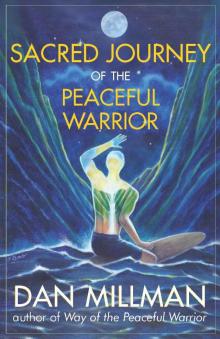 SACRED JOURNEY OF THE PEACEFUL WARRIOR
SACRED JOURNEY OF THE PEACEFUL WARRIOR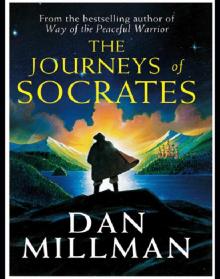 The Journeys of Socrates: An Adventure
The Journeys of Socrates: An Adventure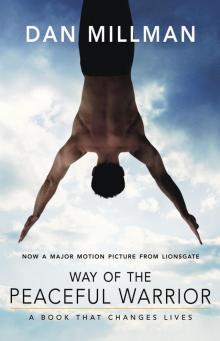 WAY OF THE PEACEFUL WARRIOR: A Book That Changes Lives
WAY OF THE PEACEFUL WARRIOR: A Book That Changes Lives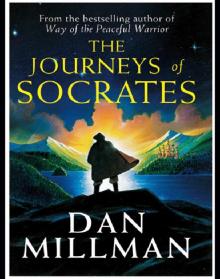 The Journeys of Socrates
The Journeys of Socrates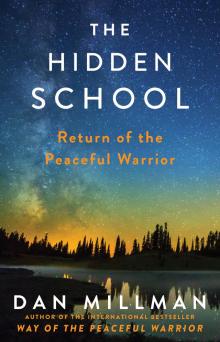 The Hidden School
The Hidden School